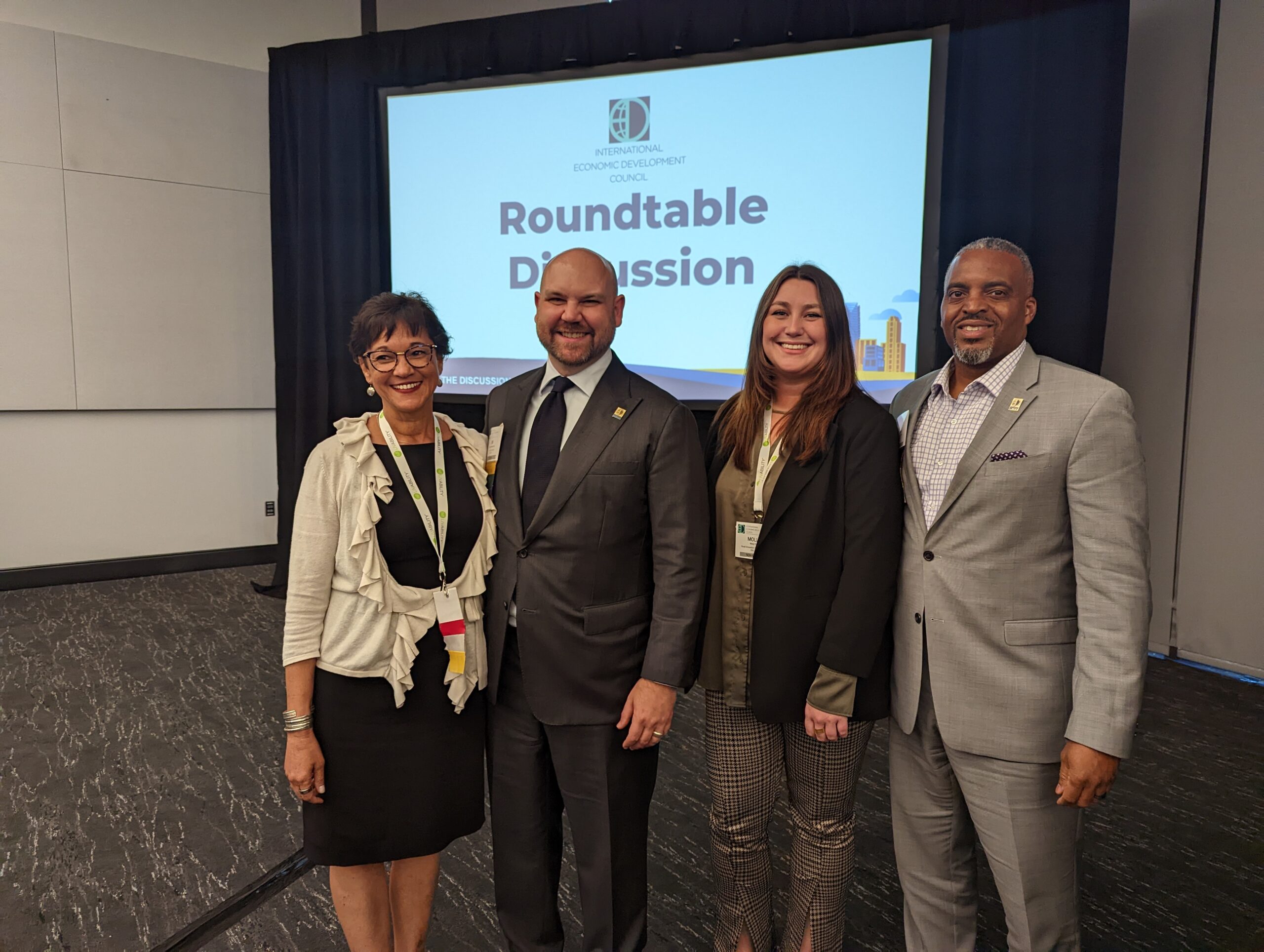
Embracing Rural Innovation: Coming Together at the IEDC Annual Conference
October 7, 2022 by Jessika Leatherbury
By: Sunnie Dawn Baker
September 18-21 of this year, members of the Ada Jobs Foundation staff had a chance to attend the International Economic Development Council’s (IEDC) Annual Conference in Oklahoma City. They were joined by economic development professionals from all around the world and had a chance to attend sessions covering a multitude of subjects as well as make connections with other organizations. One of the best things about making these connections is the spirit of global collaboration. Economic Development is about solving problems in order to strengthen our own communities, and while every community is different and has their own challenges, this spirit of collaboration can help open people’s eyes and minds to new ideas and solutions that they might not have otherwise considered.
While many of the sessions focused on workforce development, business retention and expansion, and grant opportunities, there were also many sessions that focused on how to build our communities and make them stronger. Some sessions focused on how to promote equity through redevelopment projects. Some focused on universal broadband access. While others highlighted the experience of diverse economic development professionals. Other topics, such as childcare, housing, criminal justice reform, and climate change were also addressed because all of these topics affect our workforce and our ability to grow as a stronger community with a stronger economy. In order for a community to build the ecosystem necessary for economic growth through scalable tech startups, which is one of the primary focuses of the Ada Jobs Foundation, it is necessary to address all of these issues and think of creative solutions.
The conference was an enlightening experience for the staff members who attended. Even topics such as workforce development were opened up more for our Economic Development Specialist Daniel Casteñeda. He says:
With everyone having the similar workforce issues of limited talent availability, I found it interesting to learn about the different programs and events people are doing throughout the nation to engage with youth and increase their participation in the labor force. I think for so long economic developers focused on doing it one way, but that just doesn’t work anymore. Now we have to meet them where they are, increase our engagement, and be intentional with our programs to better train the next generation of talent.
This next generation of talent is crucial to building the kind of economic growth we want in our community. They need the right kind of training, but also the right kinds of jobs in order to utilize their skills. You can’t have one without the other.
In addition to all these diverse topics, though, there was also special attention given to rural communities and the challenges that they face. There were sessions on bringing large projects to rural communities and the keynote address at the Tuesday luncheon included President and CEO of the IEDC, Nathan Ohle, as he had a conversation with Under Secretary for Rural Development with the United States Department of Agriculture, Xochitl Torres Small, and Deputy Assistant Secretary for Economic Development and Chief Operating Officer, Economic Development Administration, U.S. Department of Commerce, Dennis Alvord, as they discussed the importance of investment in rural communities. While rural communities may have been left behind in the past, it is evident that there is now a push to include them and support their economic development efforts in a significant way. “At the IEDC it is imperative that we ensure that not only our membership, but every opportunity we have to engage people, is as inclusive as possible,” said Nathan Ohle, President & CEO of the IEDC. “Representation is important, as is accessibility, and we continue to focus on driving more equitable economic outcomes for communities of all sizes and across the world.”
Of all the talk about rural communities, though, one of the most successful panels was “Rural Innovation as an Economic Development Strategy” which was led by Ada Jobs Foundation CEO, Jim Eldridge. He was joined by Molly Pyle from Rural Innovation Strategies, Inc., Mignonne Hollis, the Executive Director of the Arizona Regional Economic Development Foundation, and Kevin S. Dick, the President and CEO of the Carolina Small Business Development Fund. The room was packed with attendees wanting to know more about rural innovation and how they can use these strategies in their own communities as these four speakers each highlighted their own challenges and successes. As Hollis said during the session, “If you have seen one rural community, you have seen one rural community.” Even though each community has their own struggles, they can still learn from each other and share the things that have worked.
Eldridge shared his vision for economic growth in Rural Southern Oklahoma through the support and development of a scalable tech economy. While many people still think of innovation and scalable tech startups as something relegated to urban centers and coastal areas, forward thinking individuals are starting to realize that there is no reason why these projects can’t exist and flourish in rural America. While Ada has been lucky enough to be awarded the Build to Scale grant to help with this strategy, other communities can also take a similar approach, though tailored to their own needs.
One attendee, Galen Weibly, the Director of Economic and Community Development for the city of Presque Isle, Maine, was bolstered with new ideas about how to approach his own rural community’s developmental needs. Presque Isle has a population of a little over 9,000, so it definitely has the challenges of a rural community. However, through his experience at the conference, Weibly realized that there were many solutions to his problems that he may have never considered. Weibly says:
I found that the conversations and informational sessions offered during the IEDC conference in Oklahoma City have reignited a passion as an economic developer to start connecting the dots within my community as it relates to housing, workforce, and development opportunities in continuing to strive for new ways we can innovate as a rural community in Northern Maine.
The conference was more than just a learning opportunity, it was a chance for people to bring their ideas together and come up with new and innovative approaches to help their own communities all across the globe.
Developing a rural innovation economy and an ecosystem supportive of scalable tech startups is central to the strategy of the Ada Jobs Foundation and attendance at the IEDC Annual Conference is one of the many tools they have to make their goals a reality. Coming together with other professionals in an environment of collaboration and creative solutions helps give the attendees, including those from the Ada Jobs Foundation, the ideas and expertise to transform their own communities for the better.
Sign up to receive more news from the Ada Jobs Foundation HERE!
Written by
Jessika Leatherbury
You may also interested in:

BUILDING FUTURES: WORK READY ADA CELEBRATES ITS FIRST YEAR
BY: CATHLENA SPENCER Just one year ago, Work Ready Ada, a new employment readiness program, was launched in partnership with Pontotoc Technology Center (PTC). The program, funded by Oklahoma Human
AI IN EDUCATION: A CONVERSATION WITH VINAYAK MITTY
BY: SUNNIE DAWN BAKER One of the areas in technology with the most potential for entrepreneurial growth is Artificial Intelligence (AI). AI is increasingly shaping every part of our lives,
Adapt and Overcome: Allison Poe’s Recipe for Resilience and Growth
By: Sunnie Dawn Baker Allison Poe has always followed her feet. She waits for the signs to appear and, once she recognizes them, she travels that path, and has never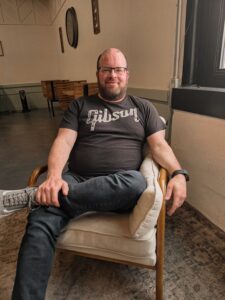
Jeff Warren: A Life in Sound, Vision, and Storytelling
By: Sunnie Dawn Baker When Jeff Warren got involved in the Houston music scene as a teenager, he had no clue where his path would lead. Now, nearly thirty years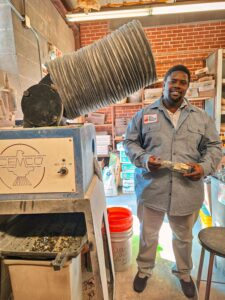
From Pitch to Progress: ECU's Glass Recycling Program Turns Waste into Opportunity
By: Sunnie Dawn Baker In 2018, Dr. Christine Pappas competed in Ada Jobs Foundation’s Big Pitch Competition by promoting grinding glass bottles into sand. She won the Big Pitch that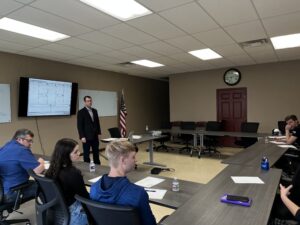
The Importance of Customer Discovery: Know Your Audience and Know Your Market
By: Sunnie Dawn Baker Entrepreneurs and small business owners must consider many factors to achieve success, with their target market being one of the most crucial. Sometimes, when people are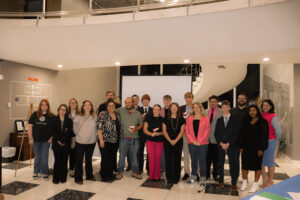
What Does Economic Development Do for You? The Significance of the Economic Multiplier
By: Sunnie Dawn Baker People often find the term “economic development” vague and confusing. Understanding how economic development works and benefits the community can be challenging. Though there are many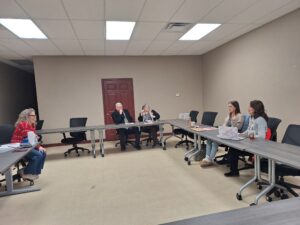
Helping Entrepreneurs One Workshop at a Time: Lauri Rowe and QuickBooks for Small Businesses
Entrepreneurs tend to be filled with passion and big ideas. They have found a solution to a problem they see in the world, and they barrel ahead, excited for their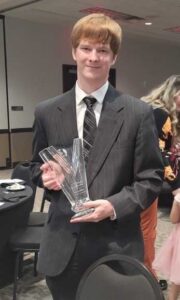
Hunter Cook: Technology, Entrepreneurship, and the Written Word
By: Sunnie Dawn Baker Hunter Cook started writing when he was seven years old. At first, he wanted to write comic books, but then he realized he couldn’t draw. He